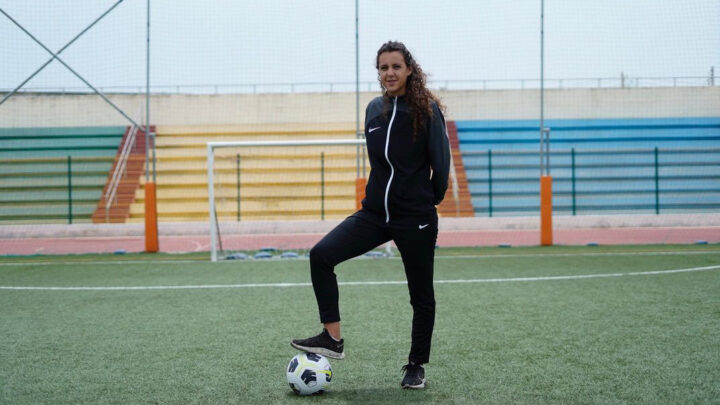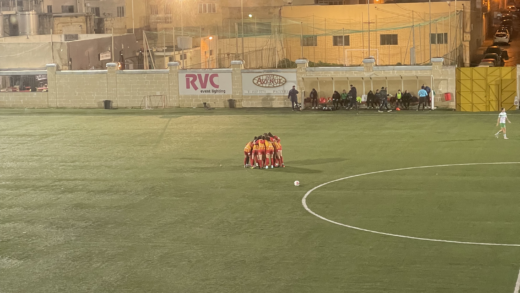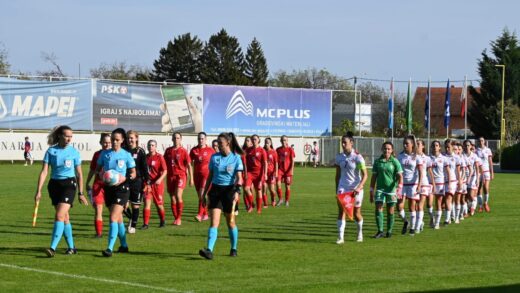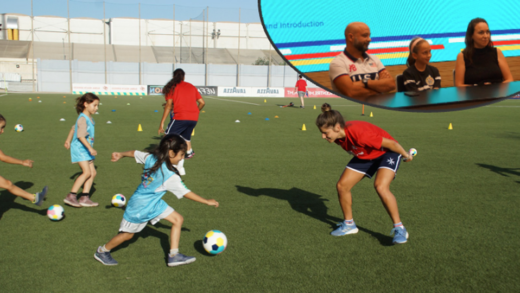Martina Borg shook many when she announced her retirement from the national team last month, at just the age of twenty-six, teasing that she will be giving something back. Part 1 covered the rationale to end her national team playing career. In Part 2 we discuss her role with NXTERA Football, the importance of sports psychology and why the paradigm shift is needed.
On Setting a Paradigm Shift with NXTERA Football
NXTERA Football launched last May, spearheaded by former national team player Andre Schembri, and international sports lawyer Luigi Fenech. Martina Borg will play a pivotal role in the day to day of the company, as the head of coaching.
The school will focus on the foundation stage, thus on developing children who are between five and twelve years of age, though for now, the school is only accepting children between the ages of five and ten. The methodology is inspired from that taught by Making Better Players (MBP) academy in Barcelona. Additional to the school in Malta, NXTERA Football has also launched a branch in Gozo, in partnership with Kercem Ajax Nursery.
Unlike other private academies, NXTERA will set an exclusive coaching methodology which inhibits students from being enrolled in club academies or other private institutions. Asked about why the academy wants this exclusivity from other clubs and academies, Borg explained that this is imperative to avoid confusing youngsters with contradictory information, “Our idea is that once they finish the foundation period with us until the age of twelve, they will then be able to filter into the clubs on our islands with the right skillset in place.”
Probed about why she chose to embark on this journey with the company Borg said, “I believe this is a great and rare opportunity to be able to work in football full time in Malta, where I get to implement what I studied academically in sports psychology together with my experience in coaching football. Despite this being an exciting opportunity, I too faced my own demons in giving up coaching the U17s with Hibernians and it was not an easy decision to take as I really enjoyed my time with the group. However, considering my own experience playing abroad I really believe that what we are teaching is crucial. It gives players the necessary skillset at the foundation stage so that they can reach their potential and succeed in the elite environment.”
She was also very clear on how much the team at NXTERA understands that this requires a paradigm shift, “We understand that this is a bit of a shock to the current system. However, we believe that this is really needed in our country. It is not new or rocket science. On the contrary, this is the norm abroad and such academies feed players into the big clubs. It is about building the courage to take the next step to change how we approach grassroots football so that ultimately, we give these children the best chance of succeeding abroad.”
What Her Day Will Look Like
Considering that Martina Borg will be the head coach, she will be very hands-on with these future players. Asked about the day-to-day Borg said, “Children will have three sessions per week, where two sessions will be structured and one session will be unstructured play. The unstructured session is similar to how when were young we used to play matches with our local friends in the street. From research we know that there is a tendency for the newer generation to be sort of robotic in play because they are so drilled in by coaches. Hence, that unstructured session is very important because it will allow children to build their own identity as players. It also showcases the technical and more creative players among the groups.”
The academic year lasts eleven months as guided by the school’s curriculum. The school will set a ‘high challenge and high support structure’ with the aim of pushing children out of their comfort zone and ensuring that they are supported in the right way as they traverse that challenge. According to Borg this is where the second pillar of their work, ‘Parent Education’, will be crucial. She explained, “We believe that this is an important part of the package. We understand that a parent’s instinct is to avoid seeing their child ‘fail’ so to speak, but we want them to guide them in how they can support the child to build the necessary toolset to get back up rather than having someone pick them up. It is about enabling the child to face failure and still fight back, rather than making sure that the child never fails because that is not a realistic expectation of life.”
Asked to elaborate on how this will be implemented, Borg said that there will be practical sessions for parents alongside founders Andre Schembri and Luigi Fenech. “The idea is that I, together with Andre and Luigi have sessions with parents to share concepts of how they can enable the children to grow their resilience. Additionally, we believe it is important to have a good relationship with parents so that they also feel comfortable in sharing any woes they may have or observations about the child.” Borg will also be able to provide support to parents as a sports psychologist.
The last pillar would be the administrative work where reports would be prepared on a regular basis to document the child’s progress and to share with the parents.
On Why NXTERA Football is Putting Emphasis on Mental Resilience
NXTERA is giving a lot of attention to the cognitive or mental aspect, which Borg alludes is becoming more crucial in the modern game. “The mental aspect dictates how quickly the player assesses the situation and can make good decisions during the match. The speed of thought of one player from another determines whether that player can find the net or not. Teaching the right habits early ensures that when they enter the competitive phase (ages twelve and older) they already have these in place. Unfortunately, if the wrong habits are formed, they are difficult to remove from your game and chances are one will keep making the wrong decision throughout, which limits growth”.
According to Borg, the school will make a big emphasis on building mental resilience and building independence in these children from a young age. Asked about a few practical examples she said, “It would start with simply asking them to do their own laces at five years of age, then progressing into other things like preparing the necessary items in their training bags or making their bed. All of this sounds simple, but it builds small steps toward when a player is going to move abroad at a young age of seventeen and faces the challenge of finding a place to live, taking care of themselves, while also facing the pressures of performing at a high level.”
The Relevance of Sports Psychology
Besides her experience playing football and coaching, Martina Borg is academically specialised in sports psychology. This is something that has been embedded in foreign academies for a while, but it is an area that in Malta is still somewhat limited in application despite increasing awareness.
Questioned about the relevance of sports psychology Borg said, “Psychology is the study of human behaviour. By extension, sports psychology is applying the understanding of why people behave in a different way to a sports setting. It aims to train a person so that they can adjust their behaviour to reach optimal performance in the high-pressure environment of elite sports.”
She elaborated with some practical examples, “Proper training enables a person to better deal with setbacks such as for example a long-term injury, adversity from a coach, dealing with the pressure of scoring a last-minute penalty, fighting for your place in a team, building confidence and resilience. These are all things that a player will have to deal with in their footballing career, and this is why we are passionate about implementing it in our teaching.”
How Would Having This Training Have Helped Borg?
NXTERA Football’s approach is rather different to how things are currently done at grassroot level in Malta. Considering all of this, The Sporting Fan asked Borg for a practical example of where having this training at a young age would have helped her in her footballing career, especially when she played in Italy.
She replied, “My first few days and weeks abroad were like a trauma. I was completely lost in how to be able to handle everyday chores, whilst also facing the pressures of performing at that high intensity environment and in a foreign country. I was really anxious and there were a number of points where I would have packed everything and returned home. Luckily, I found support from professionals and from my parents. It enabled me to get through that difficult period and build the necessary mental fortitude to stick with it.” She continued, “Unfortunately, the reality is that not everyone manages to find that support in time and this is why we see players go abroad and come back after just a couple of months. It is a result of not having these mental skills taught from a young age.”
Besides her own experience, Borg said that one can also refer to founder Andre Schembri’s experience who has also been vocal about facing his own demons while playing abroad. Considering all of this, it is why they believe the complete package being provided by NXTERA Football, including the mental skillset being taught, will be crucial, “By teaching these children resilience and independence in the foundation stage, we will be preparing them for the challenges that they will face when they try to make it in an elite environment.”
Those interested in learning more about NXTERA Football may do so by visiting their website: www.nxterafootball.com
Photo: NXTERA Football



